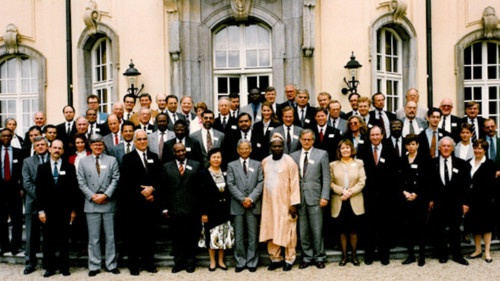
Date: 2024-12-26 Page is: DBtxt003.php txt00025018
ACCOUNTABILITY
TRANSPARENCY INTERNATIONAL
It’s our birthday! We are turning 30 and feeling nostalgic. ... BUT IT IS ALSO A TIME TO ASSESS THE RESULTS
TRANSPARENCY INTERNATIONAL
It’s our birthday! We are turning 30 and feeling nostalgic. ... BUT IT IS ALSO A TIME TO ASSESS THE RESULTS
Original article:
Peter Burgess COMMENTARY
Peter Burgess
Fri, Jun 16, 10:53 AM Transparency International ... Transparency International
Hi Peter,
It’s our birthday! We are turning 30 and feeling nostalgic.
On this week in 1993, a powerful movement was born. For three decades, we’ve pushed the global anti-corruption agenda forward and haven’t looked back. What began as a few like-minded individuals has blossomed into an extraordinary global movement, with 100+ chapters and partners across all continents. Together we are aligned in a mission to hold power accountable for the common good.
When Transparency International began, corruption was often overlooked – with many accepting it as an unfortunate norm of daily life. But through continuously challenging corruption, we’ve not only made it part of the public discourse but also shown that it can be confronted and overcome.
In celebration of our 30-year anniversary, let’s throw it back to some of our key milestones and also look toward the future – there’s still a long way to go and we’re not going to stop.

Transparency International’s founding meeting in 1993. Image: Transparency International
Building a corruption-free world means having the tools to tackle it. Since 1995, our annual Corruption Perceptions Index (CPI) has been the leading global indicator of public sector corruption levels, and starting in 2003, we began to run the only global public opinion survey on corruption: the Global Corruption Barometer (GCB). Our flagship public project monitoring tool – the integrity pact – has been used for the past two decades to monitor public contracting and, so far, has protected over a billion dollars’ worth of public procurement projects in 30+ countries.
But knowing that tools were not enough, we also came together to generate collective action. Our movement contributed to the first and most comprehensive binding global agreement against corruption, the United Nations Convention against Corruption (UNCAC). The convention entered into force in 2005, and as of today, it is signed by 189 governments across the globe. Alongside other allies, we drove the adoption of the OECD Anti-Bribery Convention, which criminalises bribes to foreign public officials by companies doing business abroad.
More recently, together with the Organized Crime and Corruption Reporting Project, we established the Global Anti-Corruption Consortium, which accelerates the global anti-corruption agenda through investigative journalism and civil society advocacy. The consortium successfully uncovered the Azerbaijan Laundromat and the Great Gambia Heist, just to name a few.
Additionally, our Secretariat is the governing body of the International Anti-Corruption Conference (IACC) – the biggest global forum that brings together heads of state, business leaders, investigative journalists, activists, and young people worldwide to discuss solutions to tackle corruption and collectively set the anti-corruption agenda.
Over the past 30 years, corruption has become more complex and sophisticated, manifesting in cross-border relationships and the global geopolitical sphere. But we’ve transformed as well.
Since 2016, we’ve advocated for public company ownership registries to expose shady figures that use opaque business structures to hide their assets. Through our ongoing beneficial ownership transparency campaign, we were able to convince the Financial Action Task Force to revise the global standard on corporate transparency, which covers over 200 jurisdictions.
We are also tackling the link between corruption and discrimination, highlighting how certain forms of corruption harm specific groups of people disproportionately, with one of these issues being sextortion – the abuse of power to obtain a sexual benefit.
And with scientists warning that this is our last chance to save the planet from irrevocable damage due to climate change, we cannot afford to have climate action undermined by corruption. As a result, our movement is promoting transparency and accountability in all climate policy-making.
After 30 years, our purpose is more topical, relevant and urgent than ever – the world needs a global movement that holds powerful people to account for the common good while convening and strengthening the wider anti-corruption community. We are that movement.
FEATURED STORY
Transparency International’s 30th anniversary: A milestone in the global fight against corruption
Over the past three decades, our movement and allies have worked hard to bring corruption to the forefront of the global agenda. With a rise in attacks against fundamental rights and freedoms, our work has never been more urgent.
RECENTLY RELEASED
Protecting the Sahel and beyond: How safeguarding against corruption could make the Great Green Wall a reality
Corruption poses a significant threat to global efforts to mitigate the ongoing climate crisis, and the Great Green Wall Initiative (GGWI) is not immune. It is crucial to prioritise good governance and accountability in climate action for the GGWI to become a powerful force for sustainable development in the Sahel and beyond.
Leveraging civil society to combat corruption risks in emergency response management: the COVID-19 experience
During the COVID-19 pandemic, unprecedented amounts of public money were spent. And similarly to previous crisis situations, corruption was able to seep through the cracks, especially with procurement and spending by authorities. The pandemic showed how corruption truly does cost lives and it is important to learn from best practices to improve future responses to global emergencies.
Transparency International Secretariat
Alt Moabit 96, 10559 Berlin Germany